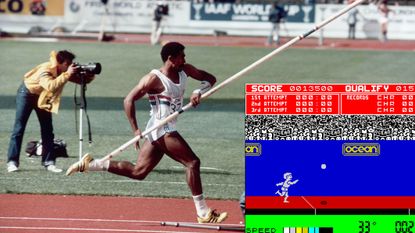It doesn't happen often that you get the chance to sit down for a chat with a legendary Olympian but this is exactly what happened to me – over Zoom anyway – when I was offered a chance to speak to two-time Olympic gold winning decathlete Daley Thompson. It was arranged as part of Bridgestone's Kitting Out event as Daley is now an ambassador for the tyre brand.
Daley won his second Olympic Gold medal in the year I was born, 1984, when he was at the peak of his athletic career. During the interview, we talked about these days as well as his rivalry with Jürgen Hingsen – the world's second best decathlete at the time – and what he thinks about the current Olympic games. But most importantly, of course, has he got any regrets about the none-more-retro video game that was named after him? Surely life is never quite the same once you've seen yourself as an 8-bit sprite…
"You have to just get out there on the days you don't want to"
T3: Originally, you wanted to be a footballer and later trained as a sprinter before transitioning into decathlon. Decathlon is quite a complex discipline, did you not find the sport intimidating at first?
Daley Thompson: To be honest, I really enjoy the acquisition of skills, like learning to kick a football or learn to Frisbee or playing tennis. Decathlon is not really any different; it's learning different skills. And clearly, my biggest skills are being able to run, jump and throw, and so it came fairly naturally.
The funny thing was, once I actually started doing that, I felt as if I was made for it. So it wasn't that difficult. It was very enjoyable. Well, a lot of people will tell you that I didn't take up the skills very well, but it was brilliant for me. It was personal.
T3: You were in record-breaking form in the first half of the 80s and won gold in two consecutive Olympic games. What was your secret of maintaining such an elite-level performance for almost a decade?
DT: I don't think there's any secrets, to be honest, most of it is fairly common sense. You just have to look after yourself. You have to really want to do it and commit yourself to it. I think that most people are not prepared to give it the important stuff, the commitment that it needs. For me – and everybody's ideas are different – commitment meant training seven days a week, 350 days a year, anywhere from five to seven hours a day.
While it's not all backbreaking and really physical, it's just a commitment. You have to just get out there on the days you don't want to, when it's raining or snowing, and you have to go and do it when nobody else is at the track. The main thing is, you have to decide how important it is for you. And if it's important, give it everything you've got so you know the answer as to how good you can be.
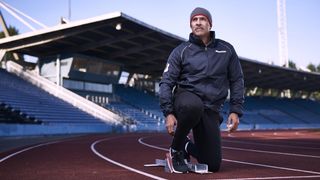
"You have to go and do it when nobody else is at the track"
"I'm most pleased about is the fact that I actually had a long international career"
T3: What motivated you to train so intensely? You must be resilience to be able to train so much for so long. And what drives you to still you to try new things?
DT: Well, I was lucky. My my mom had a really high work ethic because she always had two or three jobs in order to bring her children up. It was just something that I picked up. If you're going to do something, you work hard for it. Taking the easy option wasn't and still isn't an option for me. That's really what it is. It's about an attitude. It's about a frame of mind.
What I'm most pleased about is the fact that I actually had a long international career. I did my first international in 1975 or 1976 and my last international in 1988. 12 or 13 years is a reasonably long international career for a professional decathlete.
T3: I read about your training being – let’s say – unconventional back in the day, at least by today’s standard: you used to drink fizzy drinks and followed a not-so-healthy diet…
DT: It would be interesting to see if I could get away with it in this day and age… As for training in the 80s, because it was already tough mentally for me to keep it going every day, not being able to eat the food that you want would have made training – and life – too much of a prison sentence.
It's like being on a diet for year on year on year. It is too hard. Food was kind of a pressure release, being able to go out and have a hamburger or have food that you shouldn't eat and drink fizzy drinks. I'm also the sort of person who would rather do an extra hour of training and be able to eat the food that I want.
T3: All the extra workouts and working so hard in general must have been taxing on your body. How important rest was in your training regime? Did you sleep loads?
DT: Absolutely. I did sleep a lot. In fact, I still go to bed early: on most days I'm in bed by by 9 pm. But I'm usually up at 6 am. Not just that but I'm usually out by 6 am so I'm still getting 8-9-10 hours of sleep a day. Back then I occasionally slept in the afternoons as well. Rest is important but training is even more important.
"Since the middle of the 80s, there's not been a single time when somebody hasn't asked me about it"
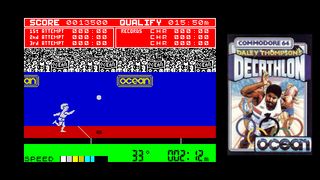
Daley Thompson's Decathlon: state of the art in 1984
T3: Can you tell me more about Daley Thompson's Decathlon? How did you end up being involved and what was your involvement in the first place, apart from being the face for the game series?
DT: The funny thing is that I didn't have a lot to do with it at all. It came out in the 80s and I happened to be very successful at the time. I was just a front person for it. But since the middle of the 80s, I promise you, there's not been a single time when somebody hasn't asked me about it. Everybody's got their own story about the game, either the broken keyboards or broken joints or whatever is.
And I am absolutely amazed that so many people played it and remember it because I didn't get that many royalties, sadly, unlike a friend of mine who's also got a game named after him, Tony Hawk, and he tells me how much money he's made. [Smiling] And I'm just jealous haha.
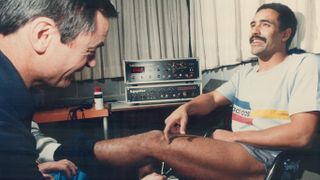
Daley in his prime looks forward to another match-up with Jürgen Hingsen
"Our rivalry was really intense"
T3: Can you tell me more about your rivalry with Jürgen Hingsen? Was it friendly competition between you two or more like a life-or-death situation? He must have been pretty upset not being able to defeat you for nine consecutive years.
DT: It was funny because, as you say, it went over a decade and every year he would try something different. One year he was really friendly, the next year he wouldn't talk to me. Good on him: he would try different ways to improve, and to have a better chance of winning. Our rivalry was really intense. And I loved it because of that. He's actually a really good athlete. He's a great athlete even. If it wasn't for me, he would have probably been one of Germany's most successful ever athletes, because decathlon is one of the things that they really like.
To tell you how much I respected him, if it wasn't for him, I wouldn't have trained for 350 days a year, five or six hours a day. I knew he was as good as me, always within arm's reach of catching up with me. I think his biggest problem wasn't that he wasn't good enough. It's just that I enjoyed being at big championships more than he did. I think if you're enjoying the big games, it's a little easier to perform well.
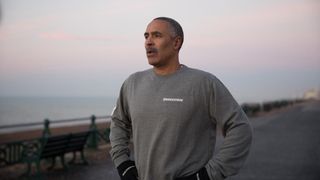
…He doesn't look too different today, does he?
"Most top, professional athletes at the Olympic Games don't necessarily enjoy the atmosphere"
T3: I can imagine the immense pressure at the Olympics: the big crowd, pressure from the team, the caches and all. If you can find at least a slight enjoyment in being there, that must give you the competitive edge over others who probably have crippling anxiety at the time.
DT: Absolutely. One thing people don't realise is that when you go to a major championship, everybody is in the same class. Everybody is living on a university campus, which obviously they're not used to doing. Everybody has to train every single day at the same place where all the competitors are. You have to see them every day. You have to meet them in the dining hall. Sometimes you have to sit at the same table as them. All of that little bit of pressure, it all adds up.
I would actually say that most top, professional athletes at the Olympic Games don't necessarily enjoy that atmosphere. They prefer going to Berlin for one night when they have one race, then the next day they're back to their friends, family and normal routine. But as soon as you go to a championship, it's completely different.
T3: Are you are you going to be attending the Tokyo 2020 Olympics?
DT: Oh gosh, I wish! But they don't allow foreigners in at the moment. I'm going to be watching it on TV, of course, just like everyone else in the world. The world needs it now: a bit of sunshine out there. I'd like to think that the Olympic Games for a couple of weeks can provide that. Some light-hearted relief.
T3: Is there anyone in particular you would like to see come out on top in this year’s Olympics?
DT: We've got four or five British girls who are just bubbling under, and have real chances for medals. It would be great if they did, I would be very proud, personally. If all four of those girls got medals and maybe one or two of them won Olympic gold medals, that'd be amazing. Especially because it's the first time, at least in in my memory, that the ladies are going to outperform men, which is really nice.

Daley and Matt hangin' out (virtually)
T3: Speaking of the Olympics: can you tell me a bit more about the Bridgestone Olympic Roadshow event? I didn't realised the company's HQ was in Tokyo.
DT: Bridgestone's got a little roadshow that's going around – it's going to be in Britain in August and they're very committed to it. It's a lot of fun because you get to meet ordinary people and talk just like we're talking now. Bridgestone has been taking it very seriously. They've got a whole load of ambassadors all over the world.
T3: Thank you for your time, Daley, it was lovely to meet you. Well, virtually.
DT: Listen, whatever you do, have yourself a great day and enjoy the Olympics!
• Bridgestone is a proud partner for the Tokyo 2020 Olympic and Paralympic games. Daley Thompson is an Olympic ambassador for Olympic and Paralympic partner Bridgestone as part of its Chase Your Dream No Matter What campaign.
• To find out more about Bridgestone’s ‘Chase Your Dream, No Matter What’ campaign, please visit Bridgestone today.
